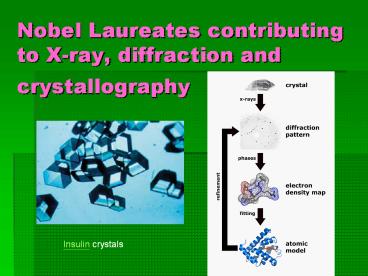Nobel Laureates contributing to X-ray, diffraction and crystallography PowerPoint PPT Presentation
1 / 12
Title: Nobel Laureates contributing to X-ray, diffraction and crystallography
1
Nobel Laureates contributing to X-ray,
diffraction and crystallography
Insulin crystals
2
WILHELM CONRAD RÖNTGEN (1845-1923)
- 1901 Nobel Laureate in Physics
- in recognition of the extraordinary services
he has rendered by the discovery of the
remarkable rays subsequently named after him.
http//www.resonancepub.com/wroentgen.htm
3
MAX VON LAUE (1879-1960)
- 1914 Nobel Laureate in Physics
- His best known work, however, for which he
received the Nobel Prize for Physics for 1914,
was his discovery of the diffraction of X-rays on
crystals.
http//nobelprize.org/physics/laureates/1914/laue-
bio.html
4
SIR WILLIAM HENRY BRAGG (1862-1942)SIR WILLIAM
LAWRENCE BRAGG (1890-1971)
- 1915 Nobel Laureate in Physics
- for their services in the analysis of crystal
structure by means of X-rays.
http//nobelprize.org/physics/laureates/1915/wh-br
agg-bio.html
5
CLINTON JOSEPH DAVISSON (1881-1958)SIR GEORGE
PAGET THOMSON (1892-1975) son of J. J. Thomson
- 1937 Nobel Laureate in Physics
- for their experimental discovery of the
diffraction of electrons by crystals.
http//nobelprize.org/physics/laureates/1937/davis
son-bio.html
http//nobelprize.org/physics/laureates/1937/thoms
on-bio.html
6
FRANCIS HARRY COMPTON CRICK (19162004)JAMES
DEWEY WATSON (1928)MAURICE HUGH FREDERICK
WILKINS (19162004)
- 1962 Nobel Laureate in Medicine
- for their discoveries concerning the molecular
structure of nuclear acids and its significance
for information transfer in living material.
Rosalind Franklin (19201958)
Maurice Wilkins
James Watson and Francis Crick
http//www.chemheritage.org/classroom/chemach/phar
maceuticals/watson-crick.html
7
Controversial statements of James D. Watson
- Stupidity is a disease and the "really stupid"
bottom 10 of people should be cured and that all
women should be genetically engineered to be
pretty. - Whenever you interview fat people, you feel bad,
because you know you're not going to hire them. - If the gene (for homosexuality) were discovered
and a woman decided not to give birth to a child
that may have a tendency to become homosexual,
she should be able to abort the fetus.
An Asshole can be smart.
8
DOROTHY CROWFOOT HODGKIN (1910-1994)
vitamin B12
insulin
penicillin
- 1964 Nobel Laureate in Chemistry
- for her determinations by X-ray techniques of
the structures of important biochemical
substances.
http//nobelprize.org/chemistry/laureates/1964/hod
gkin-bio.html http//almaz.com/nobel/chemistry/dch
.html
9
SIR AARON KLUG (1926)
- 1982 Nobel Laureate in Chemistry
- for his development of crystallographic
electron microscopy and his structural
elucidation of biologically important nuclei
acid-protein complexes.
http//nobelprize.org/chemistry/laureates/1982/klu
g-autobio.html http//www.geocities.com/n21dh/klug
-autobio.html
10
HERBERT A. HAUPTMAN (1917)JEROME KARLE (1918)
- 1985 Nobel Laureate in Chemistry
- for their outstanding achievements in the
development of direct methods to solve the phase
problems for the determination of crystal
structures.
http//nobelprize.org/chemistry/laureates/1985/kar
le-autobio.html http//nobelprize.org/chemistry/la
ureates/1985/hauptman-autobio.html
11
CLIFFORD G. SHULL (1915)
- 1994 Nobel Laureate in Physics
- for the development of the neutron diffraction
technique.
http//nobelprize.org/physics/laureates/1994/shull
-autobio.html
12
Roger D. Kornberg(1947)
- 2006 Nobel Laureate in Chemistry
- "for his studies of the molecular basis of
eukaryotic transcription" which explains the
process by which genetic information from DNA is
copied to RNA, by using X-ray crystallography to
solve the 3-dimensional structure of RNA
polymerase at atomic resolution.
Structural Basis of Transcription An RNA
Polymerase II Elongation Complex at
3.3 Å Resolution Averell L. Gnatt, Patrick
Cramer, Jianhua Fu, David A. Bushnell, and Roger
D. KornbergScience 8 June 2001 1876-1882. (PDF)

